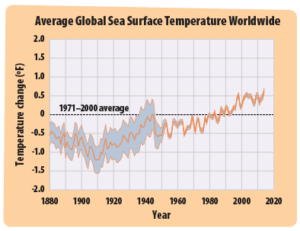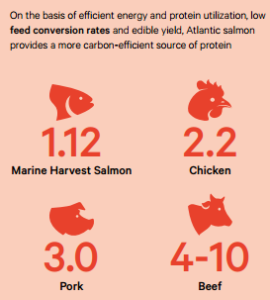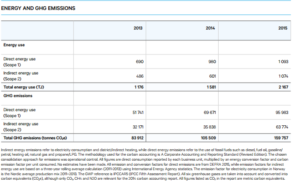Marine Harvest ASA – A Quiet Beneficiary of Global Climate Change

A salmon fishery deftly benefits from climate change even as it contributes to it.
As the impact of global climate change grows in importance to governments, businesses and consumers, one business has been able to deftly manage its perceived contribution to helping reverse the trend despite acting as a net contributor to the underlying problem. Although the Company will need to adapt its operating model to adapt to changing ocean acidity and temperatures, the Company has positioned itself well for future financial gain.
Marine Harvest ASA (“MH”) is the largest producer of salmon in the world, producing over 420,000 tons of salmon in CY 2015 and generating ~$3.5 Billion in revenue. MH operates in the salmon farming segment of the salmon market, which composes 70% of global salmon production (1). MH notes in company filings that rising ocean temperatures and ocean acidification represent substantial threats to the commercial fishing industry and that it is important for MH to “do our part to help reduce greenhouse gases in the atmosphere” (2). EPA data on global sea surface data as seen in Exhibit 1 underline the increasing warming that generates problems for MH.
Many other major issues are expected to further affect fish populations and production worldwide. Loss of snowpack, increased forest fires, more severe storms and rising ocean waters are expected to do damage to salmon estuaries and spawning grounds which will deplete natural stocks (4). Ocean acidification will damage natural food chains by destroying plankton and mollusk shells, salmon’s natural food source (5). MH has to be able to protect its production from diseases and hampered food inputs that could result from these changes. Luckily for MH, however, MH’s production is better protected from many of these issues versus commercial salmon fisheries and so will not suffer to nearly the same extent as this 30% of the market. A major notable indirect effect of Climate Change on organizations such as MH is that their own production of greenhouse gases and energy use will be scrutinized by NGO’s, consumers and governments, so MH will need to be ahead of the curve or is at risk of regulation limiting output or certain practices.
Instead of falling victim to scrutiny, MH has positioned itself to benefit from trends in global climate change while publicly touting its minimal contributions to the fight against global climate change. Marketing material favorably contrasts the carbon footprint of MH farmed salmon vs other meats such as pork and beef as seen in Exhibit 2. MH has also invested in and been subsidized in developing farming capabilities that are insulated from climate changes impact. Using public goodwill for reversing climate changes impact, MH received an incentive from the Norwegian government to develop and be licensed to use commercial closed containment farming. MH in conjunction with another company developed the “Egg” which can hold 1,000 tons of salmon and avoids virtually all issues faced by outdoor fisheries, as shown in Exhibit 3. Continued innovation only strengthens MH’s market position while others will struggle with climate deterioration. Meanwhile, MH pays lip service to its positive impacts on climate change as a means of avoiding regulation. The Company mentions the Aquatic Stewardship Council (“ASC”) 110 times in its annual report and touts its own transparency in the quality of climate change related information it discloses to the marketplace versus peers. Ironically, MH’s disclosures do not paint a pretty picture for its mitigation – much less reversal – of negative externalities generated by the Company. From 2013 – 2015, annual salmon production at MH increased at a CAGR of 11%, but energy consumption and CO2 emissions grew at a CAGR of 36% and 38%, respectively, as seen in Exhibit 4.
The macro trends for MH are very positive if it can maintain its market position. As MH has projected, 2 billion more people will live on earth in 2050, the food supply will double and 47.5 million additional tons of aquatic food will be required (2). Global climate change will concurrently do major damage to wild salmon production, which will be tremendously deleterious since 90% of world fisheries are currently fully or overfished. In this context, MH should continue to stress its comparative positive impact on the climate versus other animal proteins and its climate change advocacy. More importantly, the company should invest in R&D to ensure sustainable inputs in its food production as natural sources of salmon feed are threatened. Finally, MH should continue to innovate products like the egg which help to protect its salmon production from ocean warming and other adverse effects.
Word Count: 745
Exhibit 1(3)

Exhibit 2(2)

Exhibit 3(2)
Exhibit 4(2)

- http://www.worldwildlife.org/industries/farmed-salmon
- MH Annual Integrated Report 2015
- https://www3.epa.gov/climatechange/kids/impacts/signs/oceans.html
- http://www.nwf.org/wildlife/threats-to-wildlife/global-warming/effects-on-wildlife-and-habitat/salmon.aspx
- http://www.pmel.noaa.gov/co2/story/Ocean+Acidification




Interesting post, there is also the issue of consumer preference as many consumers prefer the taste of wild to farm-raised salmon. In the Pacific Northwest regulations also affect the salmon market as some states strictly limit the amount that can be fished except for on tribal land which leads to overfishing upstream.
Great post – very in depth description of some of the factors that MH is facing. I wonder what’s been contributing to their vastly higher energy usage versus net production of fish, and if this is a trend that one could expect to continue, as well as what MH plans to do to reverse this trend usage. Also curious on how acidification will affect their own operations in the longer term – as a farmer, they have the benefit of controlling the food, but there could be further impacts, such as changing the oxygen levels in the water or harming the salmon eggs themselves.
Will the expansion of their Egg program improve the effects on the environment? If so, great, but how can that scale to improve the entire salmon industry? It seems unlikely that self contained units could support the worldwide demand, and to continue along that train of thought, could this be applied to other species of fish? It seems like a short term fix for a long term problem.
Paul, fascinating post. Like you mentioned, MH is in an enviable position in that the demand for their product is expected to rise with global population growth and rising incomes / protein consumption. In the near term, I would also expect the demand for salmon to be very strong, as salmon is considered to be a superfood since it contains omega-3 fatty acid and thus should be a beneficiary of the focus on health & wellness in the US. Given MH’s sector leadership and competitive advantages, do you think that the Company should considering producing other varieties of fish or do you believe that they should maintain focused on salmon? Also, are there ways for the company to reduce their overall energy consumption? MH is adapting to changing environmental conditions but could be more proactive in actually mitigating climate change.
Intruiging article Paul. While I agree with you that given that the population is expected to grow to 9.7 billion people by 2050[1], and that diets are expected to shift to higher calorie, higher protein diets as many developing countries become more prosperous[2], this has a positive effect on demand for fish and therefore benefits MH, I do feel you are downplaying the effects climate change may have on disrupting this attractive dream scenario. MH still very much relies on adequate open water areas to farm salmon, areas which are greatly endangered by the rising temperature of the earth as this phenomenon is expected to reduce salmon habitat in some areas of the world by up to 40%[3]. It is far too costly for MH to produce the large volumes of salmon all in controlled environments such as the Egg – it needs to rely on open water to produce at scale. Hence, while it may on the surface look like they are well-positioned, fighting climate change is in their strong interest so as to avoid salmon production to be outcompeted by other sources of protein.
[1]United Nations, 2015, The World Population Prospects: 2015 Revision
[2]Drewnowski A., Popkin B.M., 1997. The nutrition transition: new trends in the global diet. Nutrition Reviews, 55, p. 31-43
[3]Independent Scientific Advisory Board [ISAB], 2007. Climate change impacts on Columbia River Basin fish and wildlife. Northwest Power and Conservation Council, ISAB 2007-2
Paul – highly enjoyable read. I had no idea that the salmon farming segment is better positioned than the commercial salmon fisheries to withstand the effects of climate change. I must admit that I worry about the public perception of the “Egg”. Although highly impressed by its innovative features, I could see this backfiring. It is also interesting to compare this to other fisheries (lobster, cod etc.). It is evident this is an industry in turmoil.
I was struck by the “Egg” invention. Although, from your description, it does not sound like the “Egg” mitigates the long-term effects of climate change, it is certainly an adaptive solution to a challenging problem, which MH faces. Are other fisheries coming up with similar technology of their own? If not, do you think MH would ever go into the business of selling the “Egg” to other companies?
Paul – this is a great article. I think that it was important to bring light to a company that will benefit from climate change since this is a reality for a number of companies in a variety of sectors. While there are many companies that are working to reduce their carbon footprint and combat climate change, I do wonder if companies believe that they can simply adjust their operations around climate change and ultimately keep costs lower than investing in climate change initiatives. I thought it was particularly interesting that MH is advertising its environmental responsibility programs all while knowing that it won’t be largely impacted by climate change. After reading this part of me has become incredibly critical of the programs that companies have put into place and I believe the next chapter of the corporate sustainability movement will be focused on impact and relevance versus just simply putting a sustainability program in place.
A very interesting read on how climate change efforts have two way implications, not always necessarily negative. I would like to point out two things here
1. On a micro level, once the wild salmon supplies diminish even further due to climate change, this industry will see its revenues and profits rise. However, given there is no “brand” for salmon and there is no reason for consumers to differentiate farmed salmon from farm to farm, MH won’t have the competitive advantages you assume
2. On a macro level, MH is not safe from climate change efforts. It may be forced to use genetic engineering to develop new species that are able to be farmed in warmer waters (the Egg seems to be the beginning). However, this can introduce the same consumer perception issues in seafood proteins that currently affect pork and beef (steriods, growth hormones, antibiotics, GMOs). Therefore, it is in MH best interest to protect the natural habitats because they provide a natural marketing vehicle for its product.